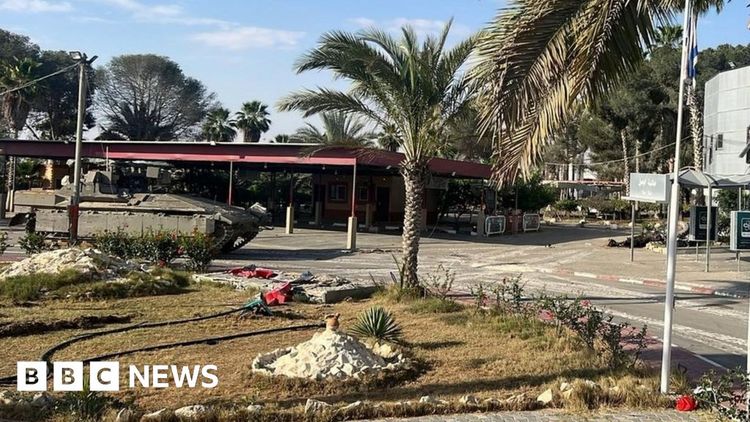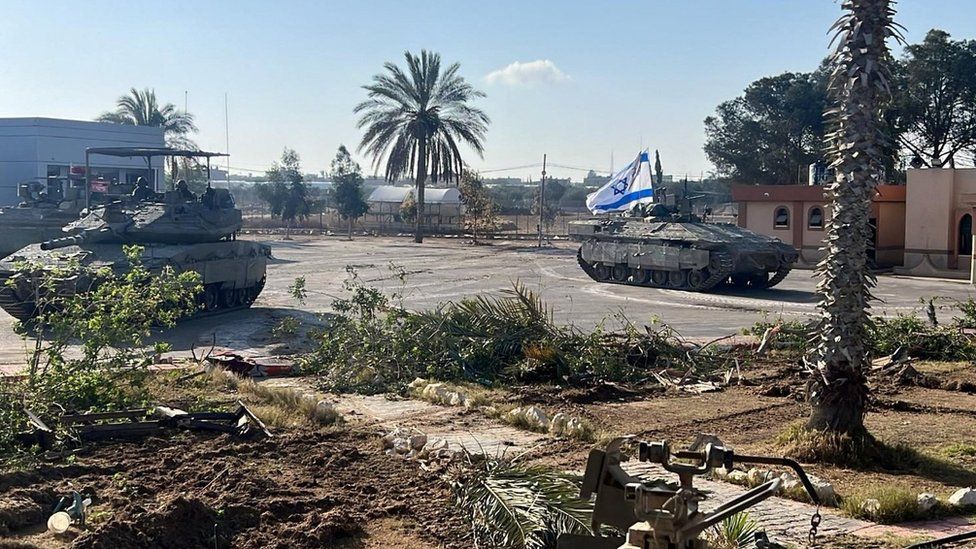Gaza: Israel takes Rafah crossing as truce talks continue

The army of Israel has shared images that portray tanks and armored automobiles located on the Gaza end of the Rafah entryway.

The military of Israel has announced that they now have "operational control" over the Palestinian side of the border crossing that connects Gaza and Egypt.
Since the beginning of the conflict between Israel and Hamas last October, Rafah has served as an important gateway for aid to be delivered and for individuals to escape the violence. Furthermore, it is the sole route for those seeking to flee the conflict zone.
Following a rigorous round of attacks, a group of tanks made their way to the crossing zone.
The United Nations issued a warning that the shutdown of Rafah has resulted in the blockage of the two primary supply routes for Gaza.
This Monday, the Israeli military commanded tens of thousands of ordinary people to evacuate the eastern parts of Rafah city that are close by. They had to do so because the Israeli military indicated that there would be a "limited" operation happening soon.
Hamas has accused Israel of trying to sabotage the efforts of local mediators who are working towards negotiating a fresh ceasefire agreement by taking control of the Rafah crossing.
On Monday, the armed group in Palestine declared that it agreed to a proposition from Egypt and Qatar. The fundamental aspect of this plan involves a halt in combat for numerous weeks and the liberation of a few dozen captives that are still being held in Gaza.
The office of Israeli PM Benjamin Netanyahu has stated that the proposal does not meet the fundamental needs of Israel. However, they have affirmed that they will dispatch a top-level delegation to Cairo to work towards an agreement that is acceptable to them.
The Secretary General of the UN, António Guterres, mentioned that he asked both parties to make an additional effort to make an agreement happen, emphasizing that it is extremely important. He also expressed that this is an exceptional chance that should not be wasted.
In response to Hamas' cross-border attack on southern Israel on October 7th, which resulted in approximately 1,200 fatalities and the capture of over 250 individuals, Israel initiated a military campaign aimed at dismantling the organization in Gaza.
The health ministry of Gaza, which is controlled by Hamas, has reported that over 34,780 individuals have lost their lives since the incidents began.
In November, an agreement was reached between Hamas and Israel involving the release of 105 hostages by Hamas in exchange for a ceasefire lasting one week, as well as the release of roughly 240 Palestinian prisoners who were being held in Israeli jails. However, according to Israel, there are still 128 hostages who have not been located, and out of that number, 34 are believed to have perished.
The inhabitants of Rafah have conveyed on the news that airdropped blasts from Israel demolished a few dwellings during the nighttime.
For a while now, Israel has strongly maintained that it needs to get rid of the last few groups of Hamas soldiers in Rafah in order to be successful in the conflict.
However, the United Nations and Western countries have cautioned that carrying out a significant land-based attack might result in disastrous effects on the well-being of the over one million uprooted Palestinians taking refuge in the area.
Last Monday evening, the city's skies were illuminated by flares and onlookers reported a sustained Israeli attack.
According to Wafa, a news agency in Palestine, local medical sources from the Kuwait Specialised Hospital confirmed that 20 individuals lost their lives while multiple others sustained injuries.
Raed al-Derby shared that his spouse and offspring lost their lives in an attack that completely destroyed their residence located in the western area of Tal al-Sultan.
He expressed to Reuters news agency that they are strong-willed and will continue to persist on their land. Their ultimate goal is to achieve freedom, and they are willing to fight for it with great courage and faith in God.
As per the reports, seven bodies have been found in the debris of two families' residences in al-Jneineh.
This area is located in the eastern part of the city and is home to around 100,000 people. The IDF issued an evacuation order on Monday for residents to move towards an extended safe zone that stretches from al-Mawasi to Khan Younis and Deir al-Balah.
An announcement was made on Tuesday morning by the IDF stating that Israeli soldiers had initiated a "precise" operation to "eliminate Hamas terrorists and take down the infrastructure supporting terrorism by Hamas in designated sections of eastern Rafah".
According to reports, fighter planes and troops on the ground targeted multiple military structures, underground equipment, and other locations where Hamas was operating in the Rafah district. As a result, nearly 20 "terrorists" were killed.
The IDF has declared that its soldiers have successfully taken control of the Rafah crossing on the Gaza side. This decision came after receiving intelligence stating that the crossing was being utilized by terrorists for their purposes.
The report did not furnish any information regarding the incident, but it mentioned that on Sunday, mortars were launched from the vicinity, which led to the loss of four Israeli soldiers' lives and caused various injuries at the adjoining Kerem Shalom crossing controlled by Israel.
A member of the IDF stated that the Rafah crossing is closed at present, but they are striving to open Kerem Shalom as soon as possible, taking into consideration the safety situation.
According to Hisham Edwan, an official from the Gaza Border Crossing Authority, Israel's decision to close Rafah has condemned the people living in the Gaza Strip to die.
As for the United Nations' Humanitarian Affairs Co-ordination Office, they have reported that Israel declined permission for their team to enter Rafah and Kerem Shalom crossings.
Jens Laerke, a spokesperson in Geneva, said that the primary routes for delivering aid to Gaza are presently blocked.
He mentioned that the UN's storage tanks only had enough fuel to last for one day, and cautioned that if there was no delivery of fuel for an extended period, it would severely impact the success of the humanitarian efforts.
The Israeli Defense Forces (IDF) did not respond immediately. However, they have confirmed their dedication to helping with the transport of humanitarian aid into and around Gaza. They have also created different entry points, including two in the northern region.
View: Gazans are questioning 'what is our next move?' following the instructions to leave Rafah. The article talks about how the Gaza Strip government has ordered people in Rafah to evacuate immediately. The citizens are very worried about the situation because they don't know where to go since they have nowhere else to live. The government did not provide the evacuees with a place to stay, which has caused a lot of distress. People have been packing their belongings and leaving, but they have no idea where they're heading to. Many are concerned that they won't be able to find proper accommodations before nightfall. The article notes that some have even chosen to stay in their homes, simply because they have nowhere else to go. The effects of the evacuation order could be devastating, with many families being left homeless and without basic necessities.
According to Sam Rose, who works for Unrwa, the biggest aid organization in Gaza, fuel is essential for everything in the area. He made this statement to the BBC while in Rafah.
According to him, the energy source is what empowers the water pipes, making the health centers function, allowing the hospitals to provide critical care. If the energy source is depleted, then every process will come to a stop.
According to Mr. Rose, the circumstances for ordinary people in Rafah are extremely distressing.
According to him, a large number of individuals are bustling through the streets. They include those residing inside the evacuation zone and others from outside, who have opted to leave earlier.
However, he expressed that they didn't have any secure places to flee to.
Half of the protected area rests on a sandy mound that is not suitable for extended stays. The remaining half is situated within Khan Younis where there has been a relentless onslaught for several weeks.
The Egyptian government strongly criticized the military action by the Israeli Defense Forces in Rafah and their control of the Rafah border crossing. They referred to it as a "serious increase in hostility" putting the lives of innocent Palestinian civilians at risk.
The statement urged Israel to use self-control and refrain from engaging in behavior that may jeopardize the ongoing discussions for a ceasefire.





























































